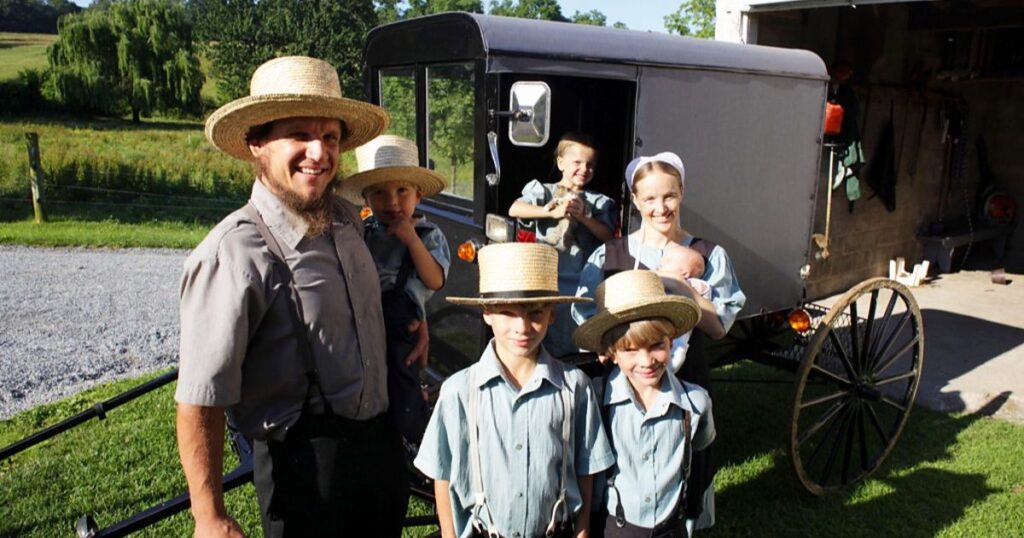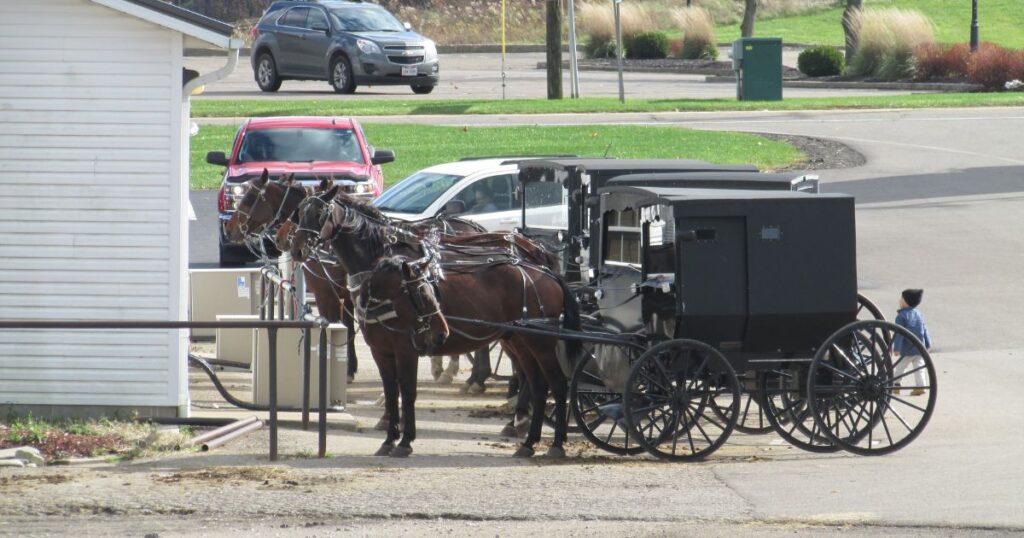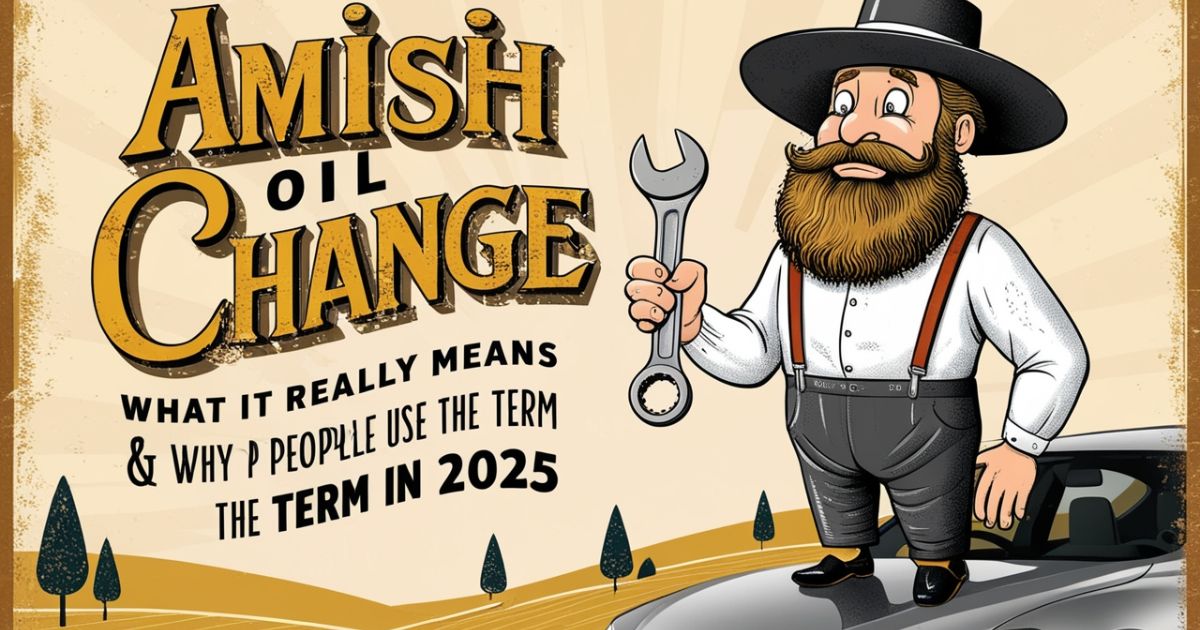The term “Amish Oil Change” has generated significant online curiosity, often associated with traditional practices, humorous interpretations, and automotive maintenance discussions. This phrase continues to capture attention across various platforms, raising questions about its actual meaning and practical applications.
Understanding this terminology requires examining both its literal context within Amish communities and its broader cultural significance. The phrase encompasses genuine maintenance practices used by Amish communities alongside humorous interpretations that have gained popularity in modern discourse.
This comprehensive analysis will explore the authentic meaning behind the Amish Oil Change, examine its historical origins, and explain its continued relevance in contemporary discussions about traditional maintenance practices and automotive culture.
What Is an Amish Oil Change?
The phrase Amish oil change encompasses multiple interpretations that range from practical maintenance procedures to cultural commentary.
Literal Meaning
The Amish community does not operate conventional automobiles, which eliminates the need for traditional oil change services. Instead, their maintenance practices focus on equipment that aligns with their lifestyle and technological choices.
Their maintenance activities include horse-drawn buggy upkeep, which requires axle grease application and wheel lubrication systems. Farm equipment maintenance encompasses plows and non-motorized agricultural tools that require regular attention. Some Amish communities also maintain diesel-powered generators that serve specific community needs within their technological framework.
Humorous & Slang Meaning
Outside Amish communities, the term “Amish oil change” has developed into popular slang with several connotations. The phrase often references the practice of greasing buggy wheels instead of performing conventional motor oil changes. It has become a colloquial expression for approaching tasks using traditional or simplified methods rather than modern alternatives.
The term also serves as humorous commentary on avoiding oil changes entirely, representing a deliberate choice to forgo conventional automotive maintenance practices. This combination of practical and humorous interpretations has contributed to the phrase’s widespread recognition and usage across different contexts.
The Amish and Technology: Why Traditional Oil Changes Don’t Apply

Do the Amish Use Vehicles?
The Amish community adheres to strict guidelines regarding technology adoption, which specifically excludes personal automobile ownership and operation. However, their transportation systems require consistent maintenance and lubrication practices that ensure reliable operation.
Horse-drawn buggies require wheel lubrication and axle grease application to maintain proper function. Wagons need wooden wheel oiling and comprehensive axle maintenance to prevent deterioration and ensure safety. Bicycles and scooters used within some communities require chain oiling and tire care for optimal performance. Diesel engines are permitted in certain communities for specific agricultural applications, though their use remains limited and regulated.
Although conventional oil changes are not part of Amish maintenance practices, they maintain sophisticated systems for equipment lubrication and mechanical upkeep that ensure their transportation and agricultural equipment operates effectively.
Why Do the Amish Avoid Cars?
The Amish rejection of personal automobiles stems from fundamental philosophical and community principles that guide their lifestyle choices.
Cars promote individualism over community-centered values that form the foundation of Amish society. Modern technology conflicts with their commitment to simple living and traditional practices that have sustained their communities for generations. The Amish prioritize self-sufficiency and deliberately avoid unnecessary dependence on external systems and services that could compromise their community autonomy.
Their transportation approach emphasizes horses, carriages, and communal transport systems that support their community structure while maintaining their technological boundaries and cultural values.
How the Amish Maintain Their Equipment Without Oil Changes

Buggy Maintenance & Lubrication
Amish buggies feature wooden wheels and metal axles that require specialized maintenance approaches distinct from conventional automotive systems.
Axle grease application prevents wear and tear while ensuring smooth operation under various weather conditions and road surfaces. Wood treatment involves applying oils that prevent wooden wheels from cracking and deteriorating due to moisture and temperature fluctuations. Leather harness conditioning maintains durability and flexibility for horse gear, ensuring safe and comfortable operation for both horses and passengers.
These traditional maintenance methods effectively replace conventional oil change requirements while providing reliable equipment performance that meets community transportation needs.
Farm Equipment & Tool Lubrication
Despite avoiding conventional automobiles, the Amish utilize various farming tools and equipment that require regular maintenance and lubrication practices.
Horse-drawn plows require greased joints and axles to maintain proper operation during agricultural seasons. Hand tools including saws and drills need oiled metal parts to prevent rust and ensure continued functionality. Water pumps utilize hand-pumped lubrication systems that maintain consistent operation without requiring external power sources or modern maintenance facilities.
While they do not utilize conventional oil change stations, the Amish maintain comprehensive mechanical upkeep practices that ensure their equipment operates reliably throughout agricultural cycles and daily community activities.
Possible Origins of the Term “Amish Oil Change”
Where Did This Phrase Come From?
The specific origin of “Amish oil change” lacks official documentation, though several theories explain its development and popularity.
Online humor and memes have contributed significantly to the phrase’s spread through social media platforms and internet communities that appreciate the contrast between traditional and modern approaches. Rural mechanic slang has adopted the term as sardonic commentary on skipping conventional oil changes or approaching maintenance tasks differently. Workshops and farming communities use the phrase to reference greasing equipment and machinery instead of performing conventional motor oil changes.
Modern Usage & Popularity
Contemporary usage of “Amish oil change” appears across multiple platforms and contexts that demonstrate its cultural penetration.
Internet forums and social media discussions frequently reference the term in automotive communities and humor-focused platforms. Comedy routines and satirical videos have incorporated the phrase into entertainment content that highlights cultural contrasts and maintenance approaches. Rural mechanic shops utilize the term in conversations about alternative maintenance practices and traditional approaches to equipment care.
Although initially representing niche terminology, the phrase has achieved widespread recognition and understanding across diverse audiences interested in automotive culture, traditional practices, and humor-based commentary.
Common Misconceptions About Amish Oil Changes

Do the Amish Ever Use Oil?
The Amish community does utilize lubricants and oils for various applications despite avoiding conventional automotive oil changes.
Buggy wheels and axles require regular oil application to maintain smooth operation and prevent mechanical wear. Farm tools and machinery need consistent lubrication to ensure reliable performance during agricultural activities. Diesel engines permitted in some communities require appropriate oil and maintenance practices that align with their technological guidelines.
Do the Amish Repair Modern Vehicles?
Some Amish and Mennonite mechanics operate repair shops that service vehicles owned by non-Amish customers, though they maintain their personal restrictions regarding vehicle ownership and operation.
Do Amish People Have Any Modern Machines?
The Amish community practices selective technology adoption that permits certain modern equipment while maintaining their core values and lifestyle principles.
Diesel-powered engines serve specific farming applications that support agricultural productivity without compromising community values. Solar energy and battery-operated tools appear in some communities as acceptable alternatives to conventional electrical systems. Mechanical equipment without electronic components aligns with their technological guidelines while providing necessary functionality for daily activities.
The Amish approach represents thoughtful technology evaluation rather than blanket rejection, choosing implementations that support their community structure and values.
Why the Term “Amish Oil Change” Stuck Around
The phrase maintains popularity across multiple contexts due to its versatility and cultural relevance.
The term serves as humorous commentary on skipping conventional oil changes while highlighting alternative approaches to maintenance and equipment care. It effectively highlights traditional lifestyle elements in ways that modern audiences find relatable and interesting. The phrase appears regularly in mechanic shops, rural settings, and online culture where it bridges traditional practices with contemporary discussions about maintenance and automotive care.
Although the Amish community does not perform conventional motor oil changes, their alternative maintenance practices and the cultural commentary surrounding these differences ensure the phrase remains relevant and widely understood across diverse audiences.
Conclusion
The term “Amish oil change” represents both authentic traditional maintenance practices and contemporary cultural commentary about alternative approaches to equipment care. While Amish communities do not perform conventional automotive oil changes, they maintain sophisticated systems for buggy maintenance, tool lubrication, and farm equipment care using traditional methods that ensure reliable operation.
Whether applied literally to describe traditional maintenance practices or humorously to comment on alternative approaches to automotive care, the phrase provides valuable insight into Amish lifestyle choices and their practical solutions for replacing modern conveniences with time-tested alternatives.
The continued popularity of this terminology reflects broader cultural interest in traditional practices, alternative approaches to maintenance, and the contrast between modern automotive culture and traditional community values that prioritize simplicity and self-sufficiency.

Hello, I’m Daisy Sadie, a writer at Azaadpuns. I explore the dynamic world of puns and wordplay, delivering captivating linguistic twists that will make you laugh and groan. Join me on Azaadpuns.com for the latest in clever wordplay that makes language fun again.

